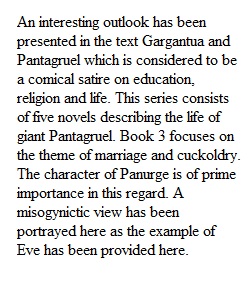


Q Week 7: Gargantua and Pantagruel Jonathan Lewis 22 unread replies.33 replies. François Rabelais was, as our editors tell us, a French humanist and scathing critic of his time and place. He was a master of farce and the carnivalesque, especially in his reversals of the social order in the work and the criticisms of everyday human ignorance. His immense book Gargantua and Pantagruel (we have only 20 of its more than 400 pages) is less a full novel than a series of adventures and philosophical debates (such as they are) that ridicules nearly every aspect of late Medieval Europe's cultures, studies, intellectuals, religious leaders and followers, and seemingly every other subject under the sun. It is truly encyclopedic in its breadth. We'll read short parts of the first European novel, Cervantes' Don Quixote next week, which is similarly encyclopedic and satirical. Rabelais built from earlier folk tales of the immense Gargantua but invented the equally huge son, Pantagruel. Their adventures are still popular with readers across the world and well worth seeking out if you enjoyed this reading. The full work remains very funny, very critical of human foibles, and, if this matters to you, quite vulgar in its full treatment of the human body, which we see in the debate between Panurge and Thaumaste. But at its heart, I think we can see a deep criticism of hypocrisy, of so-called 'learned' people who are in fact ignoramuses, and an appreciation for actual wisdom, education, and the fair treatment of others--it is notable that Rabelais was driven out of the monastic order he pledged to for daring to read Greek and pursuing an intellectual program outside the 'fossilized' (to use our editors' word) teachings of the Church. What do we think of the construction of the Abbey of Thélème in both its massive scale (nothing is small in Gargantua's world) and its simple constitution: "Do What You Will" -- is it the sort of center of learning and life that you'd want to be a part of? How does Thélème compre to a contemporary university? Could it really work--why or why not? What is the nature of the satire of Rabelais' religious world given what we see of the Abbey, its members, and its workings? Why is its basic constitution so antithetical to life in so many of human institutions? What details stand out to you in this section of the reading? In the description of Pantagruel's birth, what is Rabelais doing with the details of how he comes into the world? What is the nature of the satire in Gargantua's letter to his son--could anyone actually be this learned? While there are people who absolutely learn so many languages and read this widely, it usually takes a life-time, not a few years in a university--what is Rabelais suggesting then, about the nature of education as close-minded that Gargantua needs to set an additional level of absurd readings for his son to be educated and receive his father's blessing? How does the utterly nonsensical and vulgar 'debate' between Panurge and Thaumaste work as a satire on the so-called learned men of Rabelais' time? Overall, would you, time permitting, like to read the full story of Gargantua and Pantagruel? Why or why not?
View Related Questions